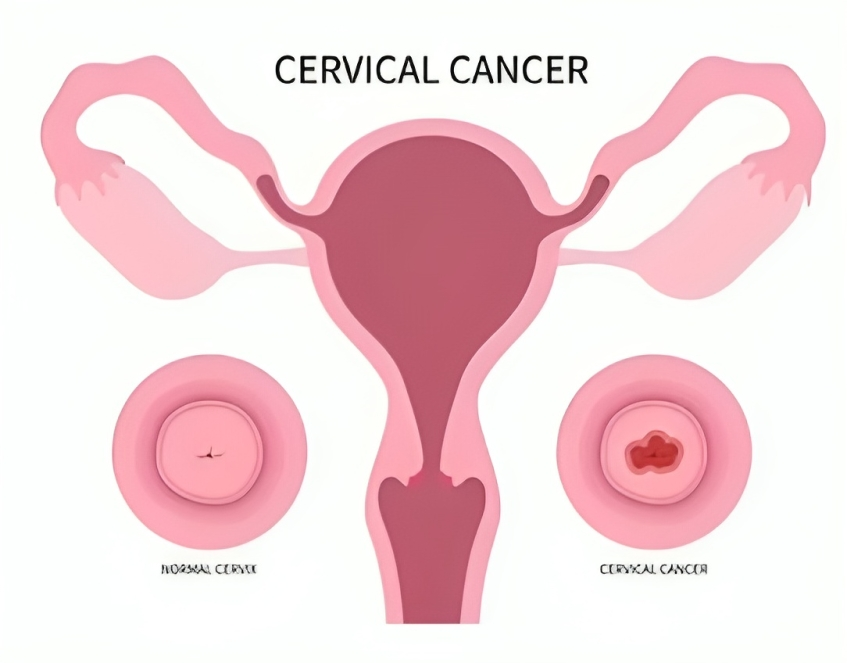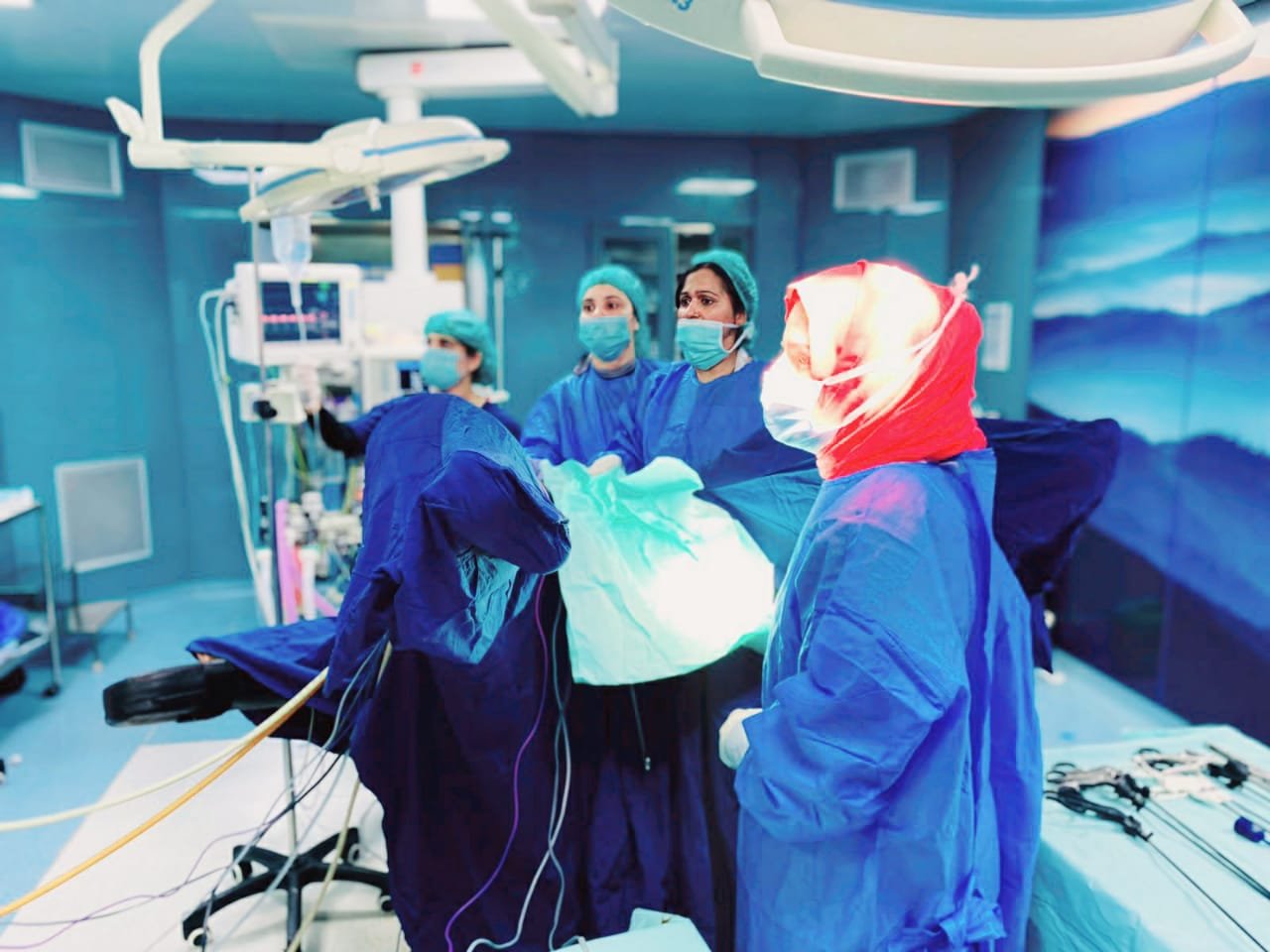Cervical Cancer Treatment
Home > Gynae Treatments > Cervical Cancer Treatment

Cervical cancer originates in the cervix. Cervix is the lower part of the uterus connecting to the vagina. It is primarily caused by certain strains of the human papillomavirus (HPV) which is a sexually transmitted infection. Cervical cancer often develops slowly with precancerous changes detectable through regular Pap smears, allowing for early intervention.
There are two main types of cervical cancer:
Squamous Cell Carcinoma: This is the most common type, arising from the squamous cells lining the cervix's outer surface.
Adenocarcinoma: This type originates from the glandular cells inside the cervical canal. It has become more prevalent in recent years and is generally detected at a slightly more advanced stage.
Understanding the types of cervical cancer empowers women to prioritize screenings, vaccination, and overall gynecological health. Early detection and appropriate medical care significantly improve the prognosis and chances of successful treatment.
Prof Dr Rehana Aamer Khan is dedicated to providing top-tier medical care as leaders in cervical cancer treatment in Lahore Pakistan. Our skilled team of doctors specializes in the comprehensive management of cervical cancer, employing cutting-edge techniques and personalized approaches. We are committed to delivering the highest quality care, ensuring that every patient receives expert guidance and treatment throughout their journey to recovery in Lahore Pakistan.
Cervical cancer is staged based on the extent of its spread. The staging system most commonly used for cervical cancer is the FIGO (International Federation of Gynecology and Obstetrics) system, which categorizes cancer into stages ranging from 0 to IV. Here's an overview of the stages:
Stage 0 (CIS - Carcinoma In Situ): Cancer is confined to the surface layer of cells lining the cervix and has not invaded deeper tissues.
Stage I: Cancer has begun to invade beyond the surface of the cervix into deeper tissues. It's subdivided into:
Stage II: Cancer has spread beyond the cervix but not to the pelvic sidewall or lower third of the vagina. It's further divided into:
Stage III: Cancer has extended to the pelvic sidewall or lower third of the vagina or may be blocking the ureters (the tubes that carry urine from the kidneys to the bladder).
Stage IV: Cancer has spread to distant organs or structures outside the pelvis, such as the bladder, rectum, or distant lymph nodes.
The stage of cervical cancer helps guide treatment decisions and predict prognosis. Early-stage cancers are more likely to be successfully treated, while advanced-stage cancers may require more aggressive treatment approaches. Proper diagnosis and staging by a doctor are essential for creating an effective treatment plan tailored to the individual's condition.
Cervical cancer may not always cause noticeable symptoms in its early stages, that is why regular screenings are crucial for early detection. As the cancer progresses, some common symptoms that might appear include:
Abnormal Vaginal Bleeding: This could include bleeding between periods, after sexual intercourse, or after menopause.
Unusual Vaginal Discharge: Changes in the color, smell, or consistency of vaginal discharge, possibly mixed with blood.
Pelvic Pain: Persistent pain in the pelvis, lower abdomen, or back.
Pain During Sexual Intercourse: Discomfort or pain during sexual activity.
Urinary Symptoms: Frequent urination, pain or discomfort during urination, or blood in the urine.
Leg Swelling: Swelling in the legs might occur if the cancer has spread to nearby lymph nodes, affecting blood flow.
Weight Loss and Fatigue: Unexplained weight loss, fatigue, and a general feeling of unwellness could be signs of advanced cervical cancer.
It's important to note that these symptoms can also be caused by various other conditions, and their presence does not necessarily indicate cervical cancer. However, if you experience any of these symptoms persistently, it's advisable to consult your doctor for proper evaluation and diagnosis. Regular cervical cancer screenings, such as Pap smears and HPV tests, are essential for early detection and improved treatment outcomes.
Cervical cancer can be diagnosed through a combination of screening tests, clinical examinations, and confirmatory procedures. Early detection and diagnosis significantly improve treatment outcomes. Here's how cervical cancer is diagnosed:
Pap Test: This is a routine screening test used to detect precancerous changes in the cervix. During a Pap smear, a sample of cervical cells is collected and examined under a microscope for abnormalities.
HPV Test: Human papillomavirus (HPV) is a major risk factor for cervical cancer. An HPV test can identify the presence of high-risk HPV strains in cervical cells, aiding in identifying those at increased risk of cervical cancer.
Colposcopy: If an abnormal Pap smear or HPV test result is obtained, a colposcopy may be performed. This involves using a colposcope, a magnifying instrument, to closely examine the cervix and identify any abnormal areas.
Biopsy: If abnormal cells are found during a colposcopy, a biopsy is performed. A small tissue sample is removed from the cervix for detailed examination under a microscope to confirm the presence of cancer cells.
Imaging Tests: In cases where cancer is suspected to have spread beyond the cervix, imaging tests like CT scans, MRI, and PET scans may be used to visualize the extent of the cancer and its potential spread.
Endocervical Curettage (ECC): During a colposcopy, an endocervical curettage may be done to obtain samples from the cervical canal, especially if the transformation zone (area at risk for cancer) is not fully visible.
Loop Electrosurgical Excision Procedure (LEEP) or Cone Biopsy: If the biopsy confirms cervical cancer or precancerous changes, further diagnostic procedures such as LEEP or cone biopsy might be done to remove a larger portion of abnormal tissue for analysis.
It's important to consult a gynecologist, who will guide you through the appropriate diagnostic steps based on your individual situation. Early detection and timely follow-up are crucial for effective treatment and improved outcomes.

The treatment of cervical cancer depends on the stage of the cancer, the patient's overall health, and other individual factors. Treatment options can include surgery, radiation therapy, chemotherapy, and targeted therapies. Often, a combination of these treatments is used to achieve the best results. Here's an overview of the treatment options:
Conization: A cone-shaped piece of tissue containing the abnormal cells is removed. This is often used for early-stage and pre-cancerous lesions.
Hysterectomy: In advanced cases or when fertility preservation isn't a concern, the uterus and sometimes surrounding structures are removed.
Radical Hysterectomy: For more advanced cases, the uterus, cervix, upper vagina, and nearby lymph nodes are removed.
Pelvic Exenteration: In rare cases of advanced cancer, this involves removing the cervix, uterus, vagina, and nearby organs such as the bladder or rectum.
External Beam Radiation: High-energy rays are directed at the pelvis from outside the body to target and destroy cancer cells.
Brachytherapy: Radioactive sources are placed directly into or near the tumor. This approach is often used in combination with external beam radiation.
Chemotherapy uses drugs to kill or slow the growth of cancer cells. It can be used alone or in combination with other treatments. It's often used for advanced stages or when cancer has spread.
These drugs target specific molecules involved in the growth and spread of cancer cells. They are sometimes used in combination with chemotherapy for advanced cases.
Some immunotherapies are being studied as potential treatments for cervical cancer. These drugs help the immune system recognize and attack cancer cells.
Patients might consider participating in clinical trials, where new treatments or combinations are being tested.
The choice of treatment depends on factors such as the cancer's stage, size, location, and whether it has spread. It is important for patients to work closely with their doctor to develop a personalized treatment plan that addresses their specific situation, while considering their overall health and individual preferences. Early-stage cancers often have a higher chance of cure, making early detection and timely treatment crucial.
We take pride in offering the expertise of the finest gynecologists dedicated to providing exceptional care for the treatment of cervical cancer in Lahore Pakistan. Prof Dr Rehana Amer Khan is heading team of highly skilled and compassionate specialist is at the forefront of cervical cancer management. Our gynecologists are equipped with the latest advancements in medical technology and treatment modalities with a focus on delivering comprehensive and personalized care of cervical cancer in Lahore Pakistan. Their extensive experience in diagnosing and treating cervical cancer ensures that patients receive the highest quality of care from diagnosis to recovery.
Prof Dr Rehana Aamer Khan and team understand the emotional and physical challenges that come with a cervical cancer diagnosis. They are committed to providing a supportive environment where patients can openly discuss their concerns, ask questions, and actively participate in their treatment decisions. From surgical interventions, such as advanced minimally invasive procedures and fertility-preserving options, to radiation therapy, chemotherapy, and emerging targeted therapies, our team tailors treatment plans to suit each patient's unique needs.
Collaboration is at the heart of our approach. Our gynecologists work in close coordination with multidisciplinary teams, including oncologists, radiologists, and pathologists, to ensure a holistic and well rounded approach to treatment of cervical cancer in Lahore Pakistan. We prioritize patient well-being, ensuring that they receive the best care available in their journey to overcome cervical cancer. Our commitment to excellence and patient-centered care makes us a trusted destination for cervical cancer treatment in Lahore.
Contact UsCopyright @ . Design By Blizin Technologies